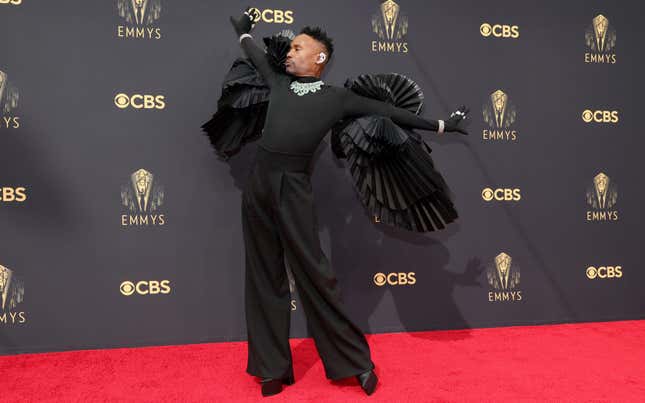
All his life he had to fight. No, really—as Pose star Billy Porter recently told the U.K.’s Sunday Times, the extravagant, gender-fluid looks he’s become known for wearing on the red carpet are the result of tremendous emotional labor and personal and professional jeopardy over his now decades-long career. Since snatching headlines for appearing on the 2019 Academy Awards red carpet in a tux-topped ballgown, Porter has made nonbinary fashion his signature, even appearing in a gown for his turn as the “Fairy Godmuva” in Amazon Prime’s recent Cinderella reboot. Nevertheless, as he told the Times, he feels he rarely gets credit for helping to push nonbinary fashion into the mainstream, while fellow entertainers like Harry Styles receive largely unadulterated praise for doing the same.
“I feel like the fashion industry has accepted me because they have to,” said Porter (h/t Rolling Stone). “I’m not necessarily convinced and here is why. I created the conversation [about non-binary fashion] and yet Vogue still put Harry Styles, a straight white man, in a dress on their cover for the first time.”
Porter’s comments were in reference to Styles’ appearance on the December 2020 cover of the famed fashion magazine—the first man to do so solo—for which the singer memorably wore a Gucci gown and sported a series of skirts for the accompanying cover story. (In all fairness, Porter was the first man to cover fellow Condé Nast imprint Allure in January 2020, as reported by The Root.)
“I’m not dragging Harry Styles, but he is the one you’re going to try and use to represent this new conversation?” Porter continued. “He doesn’t care, he’s just doing it because it’s the thing to do. This is politics for me. This is my life. I had to fight my entire life to get to the place where I could wear a dress to the Oscars and not be gunned [down]. All he has to do is be white and straight.”
Undoubtedly, Porter—like late singer Sylvester before him—has paved the way for artists like Lil Nas X to express themselves stylistically and beyond the binary—which Nas X has readily acknowledged. However, while Porter will always deserve his due, it’s also fair to note that Styles’—well, style has clearly also been heavily influenced by glam rock era stars like David Bowie and, a generation later, Boy George, both of whom also played with fluidity, professionally, sartorially and personally.
However, where Porter’s argument rings truest is in Styles’ implicit agency as a cis-gendered white man (as Rolling Stone noted, the singer has remained coy about whether he exclusively dates women). “[I]n terms of how I wanna dress, and what the album sleeve’s gonna be, I tend to make decisions in terms of collaborators I want to work with,” he told the Guardian in 2019, a year before his Vogue cover (h/t RS). “I want things to look a certain way. Not because it makes me look gay, or it makes me look straight, or it makes me look bisexual, but because I think it looks cool. And more than that, I dunno, I just think sexuality’s something that’s fun. Honestly? I can’t say I’ve given it any more thought than that.”
Must be nice—and proves Porter’s point, as there are generations who paid dearly for Styles to have that luxury, though he is far from the only one now enjoying it. Likewise, Vogue had the luxury of making Styles—a teen heartthrob-turned-stadium rock god—a convenient and provocative ambassador for gender-fluid dressing without ever having to make a more profound statement about gender, sexuality and equality, let alone how all of the above intersect with race. (Ironically, that statement came earlier in the year, when the imprint had to confront its infuriating track record of racial exclusion in June 2020.) When all the while, Billy was right there.
“I changed the whole game,” he told the Times, adding: “And that is not ego, that is just fact. I was the first one doing it and now everybody is doing it.”

